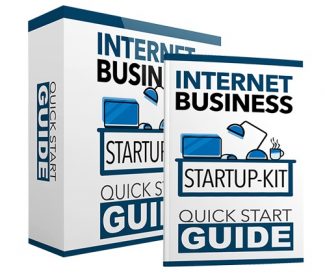 License Type: Master Resell Rights
License Type: Master Resell Rights  File Type: ZIP
File Type: ZIP
 SKU: 60583
SKU: 60583  Shipping: Online Download
Shipping: Online Download
Sample Content Preview
Introduction
Many people hear about the benefits of having their own Internet business. They hear about the ability to work from anywhere, not be tied to a cubicle in an office building, not make money for someone else, and be one’s own boss. This greatly appeals to many of them, leading them to starting their own Internet business.
Unfortunately, 95% of Internet businesses fail, many of those not making it past the first year, as many eager business owners fail to recognize that there are critical elements that must be done in order to have a successful business, something many Internet marketers leave out when they are emailing their subscribers with offers.
Fortunately, this ebook will give you the information you need to set a solid foundation for your Internet business so that you can be among the 5% that is a successful, long-lasting Internet business.
Register Your Business With a Legal Business Name
One common mistake many eager Internet business owners make is that they just grab a domain name, put up a basic website, and expect the profits to flow in. That’s not how a legitimate Internet business works.
As with offline businesses, it is important to register your business name for several reasons:
- It’s the law in most locations (including the United States)- people need to know who is running the business.
- Registering your business name prevents other people from using it. After spending months or even years building your brand and business, you don’t want someone else using your hard work and/or ruining your brand’s reputation by taking the same or similar name because you didn’t register your business name.
- You can get tax benefits, especially if you file as a limited liability corporation (LLC) or incorporate your business (INC).
- Most people feel more confident and are more willing to do business with companies that are either incorporated or an LLC than if the business is not.
There is one important exception to having to register your business name. If you plan to use your name as your business, you do not have to register that.
It is recommended that you talk to one or more qualified professionals (including lawyers and/or accountants) about your own specific situation and whether incorporating your business, filing it as an LLC, entering into a partnership, or being a sole proprietorship is best for your particular situation.
Get A Second Address For Your Business
Getting a second address for your business indicates that you are keeping your home and business mail separate, which is smart to ensure you don’t miss any mail associated with your business and get it mixed up with your personal mail. In addition, you won’t be posting your personal address on business cards or on your website, which can help to protect your privacy.
The best way to get a second address for your business is via getting a PO Box from your local post office. You can apply to rent this private box for a monthly fee (usually billed in 3-, 6-, or 12-month incremental payments), which will allow you to receive mail at your local post office. You have to fill out some paperwork and usually have to show two forms of identification before you can be approved to rent a box.
The boxes range in sizes and prices, so you can choose the one that best fits your needs and budget. Of course, the smaller the box, the more often you will have to visit your post office to pick up your mail or risk it getting too full and the post office suspending your lease, so choose wisely.
Open a Separate Business Bank Account
Just as with getting a second address for your business, opening a separate business bank account will enable you to keep your business and personal expenses separate so that there are no mistakes or oversights involving business expenses and properly recording them. Proper accounting and records are key to staying legal with your business and helping to ensure you don’t get into any financial or legal ramifications with your country’s tax division at any point in the future.
To open a business bank account at almost any bank, you need to show that you actually have a business. This usually means that you have to provide the name of the business and the nature of the business (i.e. what is the reason for its existence).
In some countries, you may have to provide an identification number known as an Employer Identification Number (EIN) or may even have to provide a copy of your business plan that includes your company’s target market, profit margins, and forecasted future earnings. All of these requirements are to show the bank that you are legitimately in business and that the bank should feel comfortable in providing you with a business bank account.
Note that you can apply for a business bank account either in person at a local branch or online. Applying for it online is often easier, and this also allows you to apply at virtually any bank anywhere, even if it’s not near your business’ or home’s location. However, it is often advantageous to have a branch of the bank that hosts your business account near your home and/or business so that if some issue or problem arises, you can easily go to the branch to discuss and resolve it. While some issues can be resolved online, others can be dealt with more efficiently if you are present in-person, which will be much harder, more expensive, and more time-consuming if the bank you choose to do business with is located far from your home and/or business.
Open A Merchant Account
A merchant account is an account that allows you to accept credit and debit card payments. In the past, you could only get a merchant account via opening such an account at a bank. However, you now have other options besides the traditional banks, including PayPal and Stripe.
No matter which option(s) you choose to have a merchant account, all merchant accounts provide you with the ability to process credit and debit card transactions. For each transaction that is processed, a percentage of the amount will be taken as compensation, known as a transaction fee. This is often in the 2-3% range, depending on the company providing you with the merchant account and sometimes even the amount of the transaction itself.
PayPal and Stripe are two companies that are really merchant account “aggregators.” Unlike merchant accounts with a bank, PayPal and Stripe allow virtually anyone to have the ability to process credit and debit card transactions, even if their business is brand new and has no history or track record of success.
Conversely, banks need to verify your business plan and know you are a legitimate business before they will consider giving you a merchant account and the ability to process credit and debit card payments. (In fact, you need a business bank account to get a merchant account with a bank).
In addition, PayPal and Stripe don’t require a monthly fee or a contract, whereas traditional merchant accounts do. Thus, if you are just starting out in business, PayPal and/or Stripe are a good way to get a merchant account quickly and begin to take order payments quickly.
- License: Master Resell Rights
- Category:Ebooks
- Tags:2017 Ebooks Master Resale Rights








